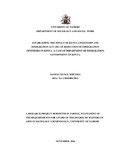| dc.description.abstract | The problem of immigration offenders is of great concern to the whole world Kenya
included. Countries all over the world are struggling with the problems of illegal
immigration, undocumented people, asylum seekers, huge number of refugees and
forgery of travel documents. Despite their efforts to find a lasting solution to this
problem there is no single solution in the foreseeable future. The objective of this
study is to assess the impact of Kenya Citizenship and Immigration Act, 2011 on
immigration offenders. Despite the previous Act having elaborate methods to control
immigration offenders like deportations, repatriations, prosecutions, removals,
increased visa and permit fees and watch listing the offenders ( Immigration Act, Cap
172) the problem of immigration offenders has continued to be a thorn in flesh to
security policy makers. The Kenya Citizenship and Immigration Act, 2011 had the
objective of introducing punitive penalties and higher fees for immigration services
that would help deter immigration offenders. The Act also aimed to introduce new
emerging offences that were not covered by the previous Act. The study adopted case
study as the research design and will used descriptive survey as a method of collecting
information by interviewing or administering a questionnaire to the sample
population. The researcher also used an interview guide which was administered to
key informants in the Department. Secondary data was also used which was derived
from immigration prosecution records. The target population was those officers in the
Department of Immigration whose duties are investigation and prosecution and
officers in charges of the Regions as key informants. The sample size was a census of
all officers involved in investigation and prosecution duties and a census of all heads
of Regions. Data was analysed using inferential statistical feature in Statistical
Package for Social Sciences (SPSS) to generate percentages, tables, frequencies
figures, correlation and cross tabulation. From the finding it was realized that
immigration offenders are not aware of Kenya Citizenships and Immigration Act
2011 neither are they aware of its provisions. It was also found that high fines,
penalties and levies have minimal impact in reduction of immigration offenders. From
the findings it was also realized that the use of punitive punishments cannot be the
best policy to be used to control crime in any society. As a consequence the study
recommended that the immigration Department should explore other method of
controlling immigration offenders as heavy fines, penalties and levies only encourage
recidivism | en_US |



